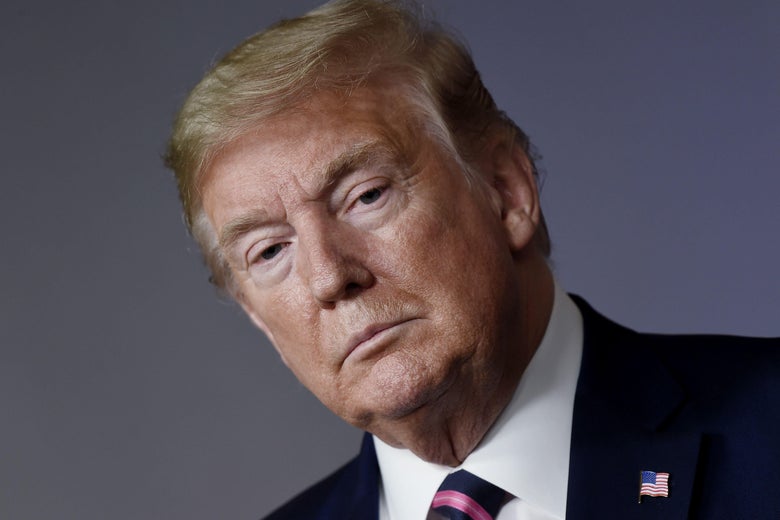
President Donald Trump looks on during the daily briefing on the novel coronavirus, which causes COVID-19, in the Brady Briefing Room of the White House on April 24, 2020, in Washington, D.C.
OLIVIER DOULIERY/Getty Images
Slate is making its coronavirus coverage free for all readers. Subscribe to support our journalism. Start your free trial.
Several poison control centers around the country have reported an increase in calls after President Donald Trump suggested that injecting disinfectants could help fight the coronavirus. Health officials quickly said that would be dangerous and Trump himself said he was being sarcastic. But it seems some people wanted to confirm the information and picked up the phone.
In Maryland, the state government sent out an emergency alert after it claimed to have received more than 100 calls on the possible effectiveness of consuming disinfectant to treat COVID-19. “This is a reminder that under no circumstances should any disinfectant product be administered into the body through injection, ingestion or any other route,” the Maryland Emergency Management Agency tweeted.
In New York City, there were also a large number of calls relating to disinfectants. The city’s Poison Control Center said it managed 30 cases of possible exposure to disinfectants in less than 24 hours after Trump’s remarks. That was more than double the number of cases in the same period last year.
Illinois also saw a sudden increase in calls. “There has been a significant increase in calls to the Illinois Poison Control Center in association with exposure to cleaning agents” since Thursday, said Illinois Department of Public Health Director Dr. Ngozi Ezike.
Trump’s remarks may have helped push the number of calls higher, but the truth is that inquiries to poison control centers were already higher before the president’s news conference Thursday. Earlier this week, the Centers for Disease Control and Prevention reported a 20 percent increase in calls to poison centers from January to March, compared to the same time last year. A significant number of those calls involve children under five, the CDC said. Just in case there was any doubt, Reckitt Benckiser, the maker of Lysol and Dettol, released a statement saying that “under no circumstance” its disinfectants should be “administered into the human body (through injection, ingestion or any other route).” If you’re curious, Slate’s Aaron Mak took a look at what would happen if you injected or ingested a disinfectant (spoiler alert: nothing good).
Readers like you make our work possible. Help us continue to provide the reporting, commentary and criticism you won’t find anywhere else.
Join Slate Plusfrom Slate Magazine https://ift.tt/3eS8p4g
via IFTTT
沒有留言:
張貼留言